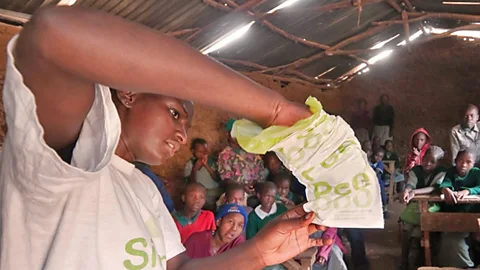Africa’s ‘Avon Ladies’ saving lives door-to-door

 Jonathan Kalan
Jonathan KalanThe Avon Company approach to sales – going door-to-door – created an enduring American brand. Now the technique is being used in Africa – but instead of perfume, it’s selling life-saving equipment.
In 1886, David H McConnell chose a cheerful 50 year old woman – Mrs Persis Foster Eames Albee – as the first sales representative for his firm, the California Perfume Company. Nowadays, the company is better known as the Avon Company, and Mrs Albee has passed into history as the first Avon Lady.
For years, she travelled by horse-drawn buggy and train across America, earning a living selling the company’s perfumes door-to-door to women, and inspiring others to do the same. What began as an opportunity for women like her to earn their own income-selling products has now helped Avon grow into an $11bn (£7.2bn) company, its products sold in over 100 countries. The now globally recognised Avon Lady distribution model has stood the test of time, and remained the company’s primary way of distributing its products.
Yet while beauty products are one thing, life-saving and even life-improving products are another.
Today, social businesses across Africa are piloting very similar ways of distributing products – from solar lighting kits to single-use toilets – to poor customers in rural and urban environments. Through networks of entrepreneurs - just like McConnell’s Avon Ladies - who earn a commission-based income, the newest and most innovative products designed for the BoP (base of the economic pyramid) now reach consumers in some of the hardest to reach markets such as urban slums and rural villages.
These modern Avon Ladies – and Avon Men - of Africa are helping pioneer a new age of product and service delivery for the poor with a truly age-old model – door to door, and village to village.
If you would like to comment on this slideshow or anything else you have seen on Future, head over to our Facebook page or message us on Twitter.
